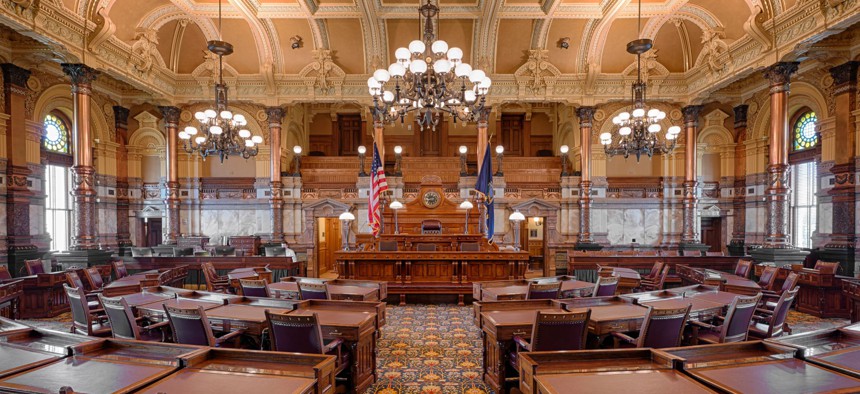On the Brink of AHCA Vote, Kansas Lawmakers Make Their Own Move on Medicaid

The Kansas Senate Chamber in Topeka Shutterstock

Connecting state and local government leaders
“I think if we waited for Washington to sort themselves out, we wouldn’t vote for anything,” one Kansas state senator told Route Fifty.
WASHINGTON — In the nation’s capital, Republican leaders in the U.S. House of Representatives worked feverishly on Thursday to round up enough votes to pass the American Health Care Act, a bill that would effectively halt all Medicaid expansion nationwide. By the early evening, it became clear that the requisite number of “yays” had yet to be reached, and the vote was delayed for at least another day.
All that drama on Capitol Hill, however, did not deter a different vote that took place more than a thousand miles away.
Despite the uncertainty over what the future holds for the Affordable Care Act, Kansas state lawmakers made the bold move to advance their Medicaid expansion proposal. The Senate Public Health and Welfare Committee passed that expansion measure, House Bill 2044, on a voice vote, and the proposal will now head to the Senate floor.
“We’re mighty excited about it,” said state Sen. David Haley, a Democrat from Kansas City, when reached by phone on Thursday.
Likewise, Sen. Laura Kelly, a Democrat from Topeka, the ranking minority member of the committee in question said that despite the fact that the state is “four years late to the table,” she too is excited that they were able to move the measure along.
The bill would increase eligibility for KanCare, the state’s privatized Medicaid program, to 133 percent of the federal poverty line—which comes out to an annual income of $24,600 for a family of four. It’s estimated that as many as 150,000 Kansans would be newly eligible for coverage under the program if the bill passes.
State Medicaid officials have said that an expansion plan would cost Kansas about $52 million per year once it’s fully implemented, and could bring in as much as $1 billion in federal health care money.
All that federal funding, of course, is contingent on what the next few days or weeks bring for the AHCA. The GOP-sponsored legislation, if it passes, would remove the provision in the current law that requires the federal government to reimburse state Medicaid expenses for states that opt into expansion at an elevated match rate—which stands at 95 percent in 2017.
When asked about the significance of passing this measure in a time of such uncertainty, neither Kelly nor Haley seemed particularly phased by the events taking place in D.C.
“I understand that not much is happening on the newly proposed health care plan in D.C. right now,” Haley said, with a trace of faint amusement in his voice.
Kelly took a similarly measured tone, pointing out that, in general, the Kansas Senate must act on behalf of its own priorities even when partisanship paralyzes the nation’s capital.
“I think if we waited for Washington to sort themselves out,” said Kelly, “we wouldn’t vote for anything.”
In reality, both senators may be right to keep their concerns closer to home. State lawmakers have good reason to believe that the most pressing threat to this piece of legislation is not the U.S. Congress, but rather, their own governor, Republican Sam Brownback.
“I’m optimistic that we can pass this through the full Senate, and then have it go on to the governor,” said Kelly. “I am less optimistic that he will do the right thing for the people of Kansas, and do what the people of Kansas want him to do, which is to sign it into law.”
Kelly is correct in her assertion that signing the expansion into law would be the will of Kansas voters. A substantial majority of Kansans—62 percent—support expansion, according to the Kansas Speaks survey from Fort Hays State University.
Nevertheless, Brownback has been a consistent critic of expanding Medicaid in the Sunflower State.
Medicaid expansion “moves able-bodied adults to the front of the line, ahead of truly vulnerable Kansans. It is not affordable, costing the state upwards of $100 million in the next two years,” Brownback said in a statement regarding expansion in early February. “Kansas should not tie itself to this failed program of the past just before its inevitable demise.”
When asked what the process has been like to get the bill this far, Kelly had a one-word response: “tedious.”
“It’s been a tough road to hoe,” she said. That Kansas road may soon get even tougher.
Quinn Libson is a Staff Correspondent for Government Executive’s Route Fifty based in Washington, D.C.

NEXT STORY: Is Seattle ‘Holding Its Gunpowder’ in Legal Fight With Trump?





